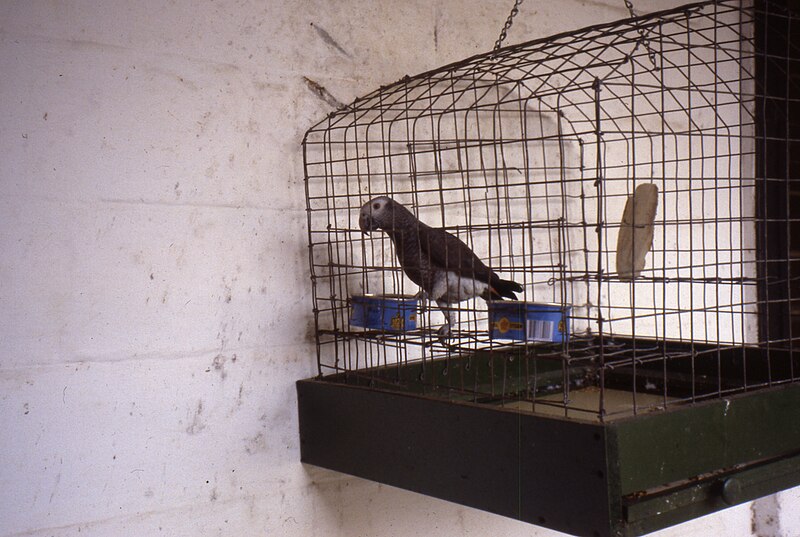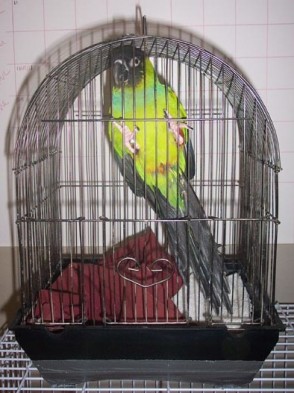by Chris Davis
- Don't assume that just because a person seems knowledgeable about birds he or she is taking adequate care of the birds being sold. Use common sense; look around and make your own assessment. For example, some of the not-so-obvious signs t look for are: cleanliness, cage size, adequate perches, appropriate diet, toys, etc. The not-so-obvious signs are also important to notice: is the bird behaving in an emotionally healthy manner? Are the cages placed so the bird can have a degree of privacy as well as god lighting. Are the cages placed away from drafts and air conditioning? Are the birds placed in an area where it is to hot? If there is more than on bird in a cage, are the birds compatible?
- Push humane societies and other animal-welfare organizations to become better educated about pet birds. Well informed, knowledgeable bird owners can offer free classes to their local humane society staff about appropriate bird care so the humane society workers can be better informed when cases arise. Free classes can be offered to the general public as well.
- If problems are observed at a pet store, and it is believed that it will not fall into legal complaint category, politely inform the pet-shop owner. Assume that they are unaware and would appreciate your comments. Visits should be brief and polite.
- With cases of neglect and/or abuse that are believed to fall in the legal category, contact your local humane society. It is important to have the complaint officially on file with an animal welfare organization. IF the animal-welfare officers are not helpful, explain thoroughly what the problem is why you consider it abuse. In some instances, it is simply a matter of educated them.
- If the humane-society officers are not amenable or do not feel that they can legally do anything to offer assistance in cases of neglect or abuse of birds, look for other problems in the pet-shop. There are health standards that pet-shops must legally adhere to for the protection of human health and, in many instances, a pet-shop that treats their birds and animals poorly is usually in violation of something else. Once a legitimate complaint is filed and investigated, it opens the door for other investigations where action can be taken. This may prompt the pet-shop owner to correct other problems.
- Encourage friends and non-bird owners to become more aware of what is right and wrong for birds, and encourage them to speak out.
- If you see neglect and poor treatment of birds in large chain pet-shops, write letters to the local store and the chain's main offices and administration. Voice your specific concerns, and threatened to boycott their store if they don't improve the conditions.
- If you know of a bird or birds that are being neglected or abuse in a private home, restaurant, etc., contact your local humane society. Usually an officer will make a polite visit to the location and let them know that a complaint has been filed. In some cases, it may prompt a bird owner to correct the problem.
- For those who would like to become more politically involved with bird welfare, contact your legislators, local city officials and national and international animal-welfare organizations. By educated them, it may open the door to better standards in your community and across your country.
- Rather than encouraging people to have birds as pets, remind them that birds aren't good pets for everyone. Give them information about the pros and cons of bird ownership.
- Encourage bird clubs to be cognizant of abuse cases and work together to rectify them.
- Don't patronize any pet-shop or breeders who are negligent or who are not giving their birds adequate care. Report them to the authorities instead. Even if nothing can be done to legally improve poor conditions, documentation of a complaint may help in future complaints.
- Be empathetic to all pet birds - even your own. With this enhanced sensitivity, you will discover situations that can be improved within your own birds' environment.
- Use tact and a level head when presenting complaints to pet-shop owners and law enforcement agencies. Hostility and anger will usually not be effective or may cause adverse reactions. However, remain firm and steadfast in your conviction to make birds' lives better.




No comments:
Post a Comment